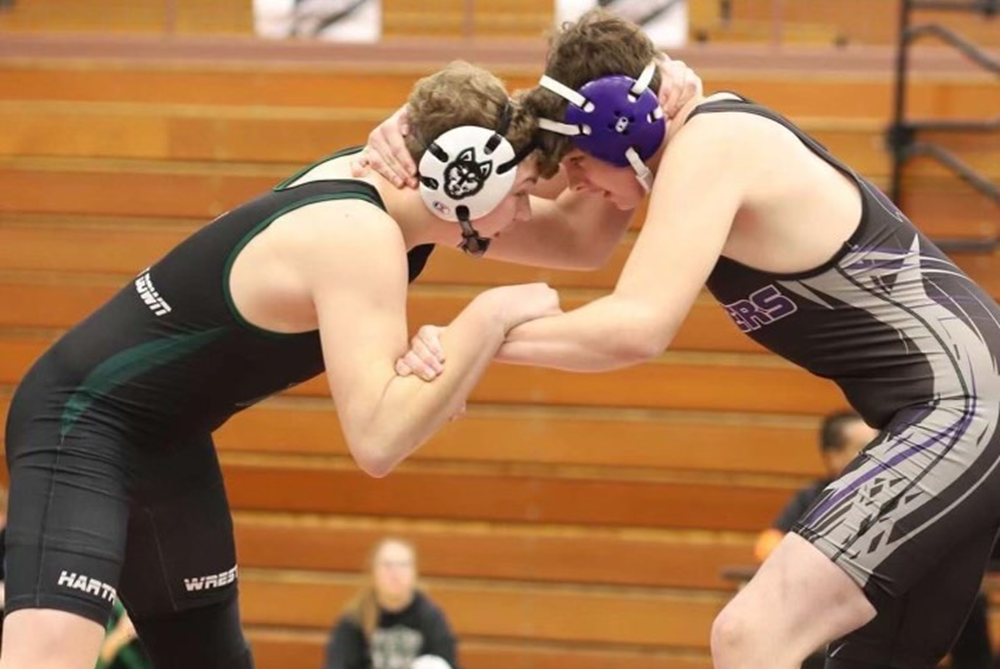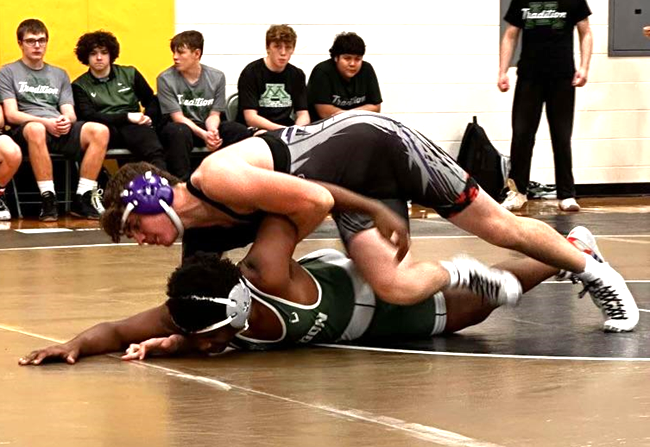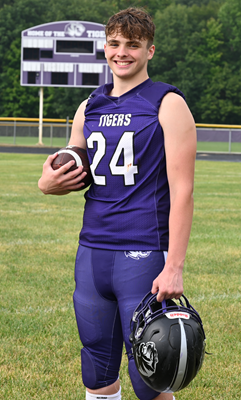
MHSA(Q&)A: NFL official Ronald J. Winter
July 19, 2012
By Brian Spencer
Second Half
 Kalamazoo's Ron Winter has officiated in the National Football League for nearly two decades, and became a referee in 1999. But long before he joined the highest level of the game, he got his start on Michigan's high school fields.
Kalamazoo's Ron Winter has officiated in the National Football League for nearly two decades, and became a referee in 1999. But long before he joined the highest level of the game, he got his start on Michigan's high school fields.
Winter has officiated that sport at all three levels and also high school and college basketball. He's also served as a source of knowledge for officials around the state -- and an example for those hoping to start at the high school level and climb to the pros.
Winter remains registered as an MHSAA official, as he's been for 42 years. An associate professor emeritus of human performance and health education at Western Michigan University, Winter was appointed earlier this month to serve a two-year term on the Governor's Council on Physical Fitness, Health and Sports. The council focuses on increasing physical activity and health improvements.
He served on the WMU faculty first beginning in 1969 and then again from 1992-2008. Winter earned bachelor and master's degrees at Michigan State University.
Did you play any sports in high school or college?
I played football, basketball, baseball, and track in high school. However, once I got to Michigan State University, I started playing lacrosse. A couple guys that lived near me played lacrosse and asked me to come out to throw the ball around. After throwing with them a couple times they asked me to come out for the team. I ended up playing lacrosse for MSU for four years.
How did you decide to choose football as the sport you would officiate?
I started officiating as a student at MSU in their intramural program, officiating touch football and basketball. The next logical step was to then officiate in the high school leagues. From there, I began to proceed to all the different levels.
Are there specific requirements for becoming an NFL official?
The biggest requirement is experience. The progression that I went through went like this:
After officiating high school games, I went to the MIAA (Michigan Intercollegiate Athletic Association). They (MIAA) were looking for people that had 3-5 years of experience at the high school level. From there I went to the Mid-Continent conference. I wasn’t able to go to the Mid-American Conference because I was employed at Western Michigan University.
From there I went to the Big Ten. The Big Ten was looking for people with 5 to 10 years of experience in high school and people that had experience at different positions as an official. I ended up officiating in as a Big Ten football official for 10 years and a Big Ten basketball official for 15 years. I then submitted an application to the National Football League. Coincidentally, the NFL was scouting officials, and had followed me for four years before they finally asked me to be a part of the staff. The NFL decides on who they want to pursue through recommendations and personal interest. They look for personality traits as well as how (officials) carry themselves through different situations.
What has been your favorite level to officiate; High school, college or professional?
I enjoyed officiating all of them, but for different reasons.
I found high school to be the most fascinating because it’s all about the kids; they are playing the game for the love of the game. That is the purest sense of the sport. I loved being involved with kids simply because they love the game.
I found the Big Ten to be most exciting because of the kind of atmosphere that exists on a Big Ten campus on a Saturday afternoon. It’s electric. You don’t get that same sense or the same feel on Sunday afternoon in a pro stadium.
I found the NFL to be most intense. The NFL really has three or four different levels of play during the season. There is preseason play, the first thirdof the season, the second third of the season, and the last five games of the season. Each level is ramped up another notch as the season progresses. Playoffs are entirely different all together. In terms of the intensity and pure speed of the game, there is nothing like the NFL playoffs.
How important is getting along with your fellow officials on the field?
It’s imperatively important if you want to have a smooth and well-run game. This doesn’t mean that you have to buddy-buddy off the field, but on the field you have to be committed to one goal. We spend two or three hours on meetings Saturday afternoon to go over rules tests, tape, and more to prepare for the next game (and) to get over rough patches that develop on a personal level in a previous week. I need to know that the other six guys are focused and thinking about football like me. Everyone has to have confidence in one another. We spend plenty of time on Saturday to get to the point that we need to on Sunday.
What has been the most exciting game you’ve officiated?
I’ve been in plenty of exciting games from NFL playoff games, to the first Orange Bowl game, to the Rose Bowl, to the Division III Hope vs. Calvin basketball game, to when Indiana played Purdue in basketball. All of them were incredible to be a part of. During the Indiana vs. Purdue game, the arena was electric. The players, coaches, fans were intense. Everybody is totally focused on the game. Each coach had a tremendous respect for one another. Neither one wanted to show up or embarrass their counterpart. This game wasn’t that drastically different at the Division III level, however. The intensity of both was very similar.
Are there games that you get excited to officiate more than others, presently?
Not in terms of specific teams. It really just depends on the circumstances, of course. Pittsburgh vs. Baltimore is an intense game. The Jets vs. Patriots game is great. There are clearly rivalries that are very exciting to be a part of. The level of play and intensity of the athletes in the NFL is unmatched and can provide excitement every week.
What is the most difficult aspect of being a NFL official?
I would say that preparation and being able to maintain intensity on the field on Sunday are key aspects. The preparation is difficult because it’s time-consuming. It is a misconception that we simply show up on Sunday to work the game. By the time Sunday rolls around, I’ve spent over 20 hours during the week trying to prepare for a Sunday game. It isn’t hard in terms of physical labor, but difficult in terms of a time commitment. You have to have an understanding family to be in the occupational field that I am in.
Do you have any advice for aspiring officials who hope to make it to the league?
Practice, practice, practice. Be able to work any game at any level and get as much experience as you can. Be a good partner on the field. It takes time; it isn’t something that just happens. Like anything else, it takes practicing your trade to be able to make it to the top level.

Inspired by Dad's Memory, Lawrence's Vasquez Emerges After Family Losses
By
Pam Shebest
Special for MHSAA.com
January 16, 2024
LAWRENCE — While COVID-19 affected many students in different ways, it definitely made an impact on Austin Vasquez.
 As a freshman at Lawrence High School during the pandemic, Vasquez lost his grandmother Theresa Phillips to cancer on March 25, 2021.
As a freshman at Lawrence High School during the pandemic, Vasquez lost his grandmother Theresa Phillips to cancer on March 25, 2021.
Two days later, on March 27, his father Tom Vasquez, died of complications from COVID. And on April 19 that spring, his grandfather Darrell “Gene” Phillips also lost his fight against the coronavirus.
“There is no way (to cope). You just have to keep on moving,” Austin said. “It’s what (my dad) would want me to do.
“He was my biggest (influence) in sports. He talked to me about never giving up – leave everything you’ve got.”
That is just what Vasquez is doing in the midst of his three-sport senior year.
He is the top wrestler at the school, competing at 175 pounds with a goal of making the MHSAA Tournament. He was a versatile contributor on the football field this past fall, and he’s planning to join the baseball team this spring.
 He’s 8-3 with six pins on the mat this winter after a busy summer of camps and tournaments. Those experiences helped lessen the nerves he’d felt during matches previously, and now he’s wrestling with an outlook of “everything to gain and nothing to lose.”
He’s 8-3 with six pins on the mat this winter after a busy summer of camps and tournaments. Those experiences helped lessen the nerves he’d felt during matches previously, and now he’s wrestling with an outlook of “everything to gain and nothing to lose.”
And Vasquez said he feels his dad’s presence as he prepares for competition.
“Before every match, before every game, I just think about what my dad would be telling me,” he said. “Everything he’s always told me has taught me to get better.
“In life, I still remember everything he taught me. He was definitely a great man, and I want to be like him someday.”
Wrestling also has made Vasquez more in tune with his health.
His sophomore season he went from 230 pounds to 215, and by his junior year was down to his current 175.
“I just wanted to be healthier, not just for wrestling,” he said. “I started going to the gym every night, watched my calories, and from there grew (taller).
“Now I’m at 6-(foot-)2, and I don’t know how that happened,” he laughed.
Lawrence coach Henry Payne said Vasquez always has a positive attitude and helps the other wrestlers in the program.
“When he notices a kid next to him doing a move wrong, he’ll go over and show him the right way,” Payne said. “We have a lot of young kids that this is their first year, and he’s been a good coach’s helper.”
The coach’s helper gig will continue after graduation.
"Next year we’re hoping to open up a youth program here, and I got him and an alumni that graduated last year and is helping the varsity team this year (Conner Tangeman) to take over the youth program for us,” Payne said.
 On the football team, Vasquez was a jack of all trades.
On the football team, Vasquez was a jack of all trades.
“He started at guard, went to tight end, went to our wingback, went to our running back. He was trying to get the quarterback spot,” football coach Derek Gribler laughed.
Vasquez said there is no other feeling like being on the field, especially during home games.
“Wrestling is my main sport, but I’d do anything to go back and play football again,” he said. “I just love it.”
Although the football team struggled through a 1-8 season, “It was still a really fun season,” Vasquez said. “Everybody was super close. Most of us never really talked before, but we instantly became like a family.”
Vasquez had the support of his mother, Heather, and four older sisters: Makaylah, Briahna, Ahlexis and Maryah. He also found his school family helped him get through the end of his freshman year.
“(My friends) were always there for me when everything was going on,” he said. “I took that last month off school because it was too hard to be around people at that time.
"Every single one of them reached out and said, ‘Hey, I know you’re going through a rough time.’ It really helped to hear that and get out of the house.”
 The family connection between Vasquez and Lawrence athletic director John Guillean goes back to the senior’s youth.
The family connection between Vasquez and Lawrence athletic director John Guillean goes back to the senior’s youth.
“I was girls basketball coach, so I coached his sisters,” Guillean said. “I remember him when he was pretty young. I knew the family pretty well. I knew his dad. He was pretty supportive and was there for everything.”
Vasquez said that freshman year experience has made him appreciate every day, and he gives the following advice: “Every time you’re wrestling, it could be your last time on the mat or last time on the field. Treat every game and every match as if it’s going to be your last. If you’re committed to the sport, take every chance you have to help your team be successful.”
Gribler has known Vasquez since he was in seventh grade and, as also the school’s varsity baseball coach, will work with Vasquez one more time with the senior planning to add baseball as his spring sport.
“When we talk about Tiger Pride, Austin’s a kid that you can put his face right on the logo. His work ethic is just unbelievable,” Gribler said. “Everything he does is with a smile. He could be having the worst day of his life, and he’d still have a smile on his face. He pushes through. It’s tough to do and amazing to see.”
The coach – who also starred at Lawrence as an athlete – noted the small community’s ability to rally around Vasquez and his family. Lawrence has about 150 students in the high school.
“It goes beyond sports,” Gribler said. “Austin knows when he needs something he can always reach out and we’ll have his back, we’ll have his family’s back. It’s not so much about winning as it is about the kids.”
Vasquez is already looking ahead to life after high school. He attends morning courses at Van Buren Tech, studying welding, and returns to the high school for afternoon classes.
“I’d like to either work on the pipeline as a pipeline welder or be a lineman,” he said, adding, “possibly college. I would like to wrestle in college, but let’s see how this year goes.
“I’m ready to get out, but it’s going to be hard to leave this all behind.”
 Pam Shebest served as a sportswriter at the Kalamazoo Gazette from 1985-2009 after 11 years part-time with the Gazette while teaching French and English at White Pigeon High School. She can be reached at [email protected] with story ideas for Calhoun, Kalamazoo and Van Buren counties.
Pam Shebest served as a sportswriter at the Kalamazoo Gazette from 1985-2009 after 11 years part-time with the Gazette while teaching French and English at White Pigeon High School. She can be reached at [email protected] with story ideas for Calhoun, Kalamazoo and Van Buren counties.
PHOTOS (Top) Lawrence senior Andrew Vasquez, right, wrestles against Hartford this season. (2) Vasquez works on gaining the advantage in a match against Mendon. (3) From left: Lawrence wrestling coach Henry Payne, athletic director John Guillean and football and baseball coach Derek Gribler. (4) Vasquez also was a standout on the football field. (Wrestling and football photos courtesy of the Lawrence athletic department. Headshots by Pam Shebest.)

